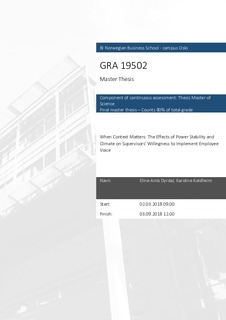When Context Matters: The Effects of Power Stability and Climate on Supervisors' Willingness to Implement Employee Voice
Master thesis

View/
Date
2018Metadata
Show full item recordCollections
- Master of Science [1621]
Abstract
Implementing employee voice can have substantial organizational benefits. Yet,
supervisors frequently fail to implement subordinates’ improvement-oriented
suggestions. To help explain this tendency, this thesis examines whether contextual
factors, such as the stability of power and nature of the departmental climate in
which the supervisors are part of, can influence their willingness to implement
voice, as well as whether these factors interact. Study 1 (N = 242) demonstrates that
although the stability of power does not directly affect willingness to implement
voice, a competitive – as opposed to a cooperative – climate decreases voice
implementation, an effect that only occurs when supervisors have stable – and not
unstable – power. The effect of climate is further supported in Study 2 (N = 114),
which also reveals that supervisors’ denigration of subordinate benevolence
mediates the relationship between climate and willingness to implement voice. The
present research extends the extant literature on both voice and leadership by
considering the role of the supervisor’s context to understand voice implementation,
as well as provide important implications for practice. Furthermore, we point out
several new avenues for future research.
Keywords: voice implementation, power stability, climate, threat, denigration of
subordinate benevolence
Description
Masteroppgave(MSc) in Master of Science in Leadership and Organizational Psychology - Handelshøyskolen BI, 2018